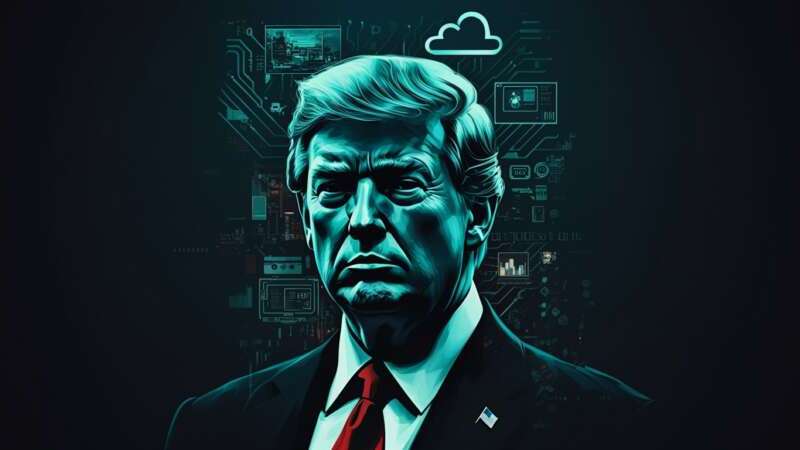
The Trump administration’s AI Action Plan seeks to ramp up artificial intelligence innovation and development while cutting “red tape and onerous regulation” in an effort to give industry a helping hand – but it’s receiving mixed reviews.
Released on Wednesday, the White House’s long-awaited plan includes 90 future Federal government policy actions to come in the next weeks and months that will speed up the development of AI and make it easier to power and build AI data centers.
While the AI action plan largely favors industry’s innovation efforts – after many AI developers have called for loosened regulation to speed up development – reception of the AI action plan has been both decried and praised.
“Securing AI systems and ensuring that they perform as intended is essential for establishing trust in their use and enabling their responsible deployment,” said Ilona Cohen, chief legal and policy officer at HackerOne, in a statement. “The U.S. AI Action Plan and other directives to federal agencies have acknowledged the importance of security and public trust in AI.”
Jason Oxman, president and CEO of advocacy group Information Technology Industry Council, similarly praised the action plan as helping to “usher in a new era of U.S. AI dominance.”
“The administration’s vision takes essential steps to ensure the U.S. can win the global AI race by prioritizing U.S. energy production and infrastructure development to power AI’s growth, promoting U.S. AI leadership internationally by supporting the export of the full stack of American AI technologies to partners and allies, and accelerating adoption of AI across the public and private sectors,” said Oxman in a statement.
The action plan, which included a focus on bolstering AI-related workforce training, will further help ensure that “all communities can participate in and benefit from AI’s potential,” said Paul Lekas, senior vice president of global public policy at the Software and Information Industry Association.
“We’re especially encouraged by the plan’s focus on workforce development and AI literacy as core elements of AI infrastructure,” said Lekas. “We call on the Administration to take action to ensure that schools and institutions receive the resources they need to realize this vision.”
It also lays the groundwork for “beating China in AI,” according to center-right group R Street Institute, with Adam Thierer, resident senior fellow of technology and innovation, saying in an analysis following the plan’s release that the White House meets the group’s submitted recommendation that the government bolster America’s global dominance in AI while strengthening cybersecurity.
“Taken together, the new AI Action Plan and the policy actions that preceded it make it clear that beating China in AI is the administration’s top priority and that the freedom to innovate and invest is the key to winning,” wrote Thierer.
Despite its praise, the plan has also received criticism from more than 80 labor, environmental, civil rights, and other groups who signed their own “People’s AI Action Plan,” released Tuesday ahead of the government’s plan.
“We can’t let Big Tech and Big Oil lobbyists write the rules for AI and our economy at the expense of our freedom and equality, workers and families’ well-being, even the air we breathe and the water we drink – all of which are affected by the unrestrained and unaccountable roll-out of AI,” the groups said in a joint statement.
The plan calls for “relief from the tech monopolies who repeatedly sacrifice the interests of everyday people for their own profits.” It instead advocates for a plan “that delivers on public well-being, shared prosperity, a sustainable future, and security for all.”
In individual statements, organizations pointed to elements of the action plan that are like those in the controversial moratorium on state AI laws that was ultimately stripped from the reconciliation bill after the Senate voted down the provision 99-1 following sharp criticism from both Republicans and Democrats.
“President Trump’s attempt to restrict state AI regulations is not only harmful, it raises serious legal questions as the president is acting beyond any statute passed by Congress,” said Cody Venzke, senior policy counsel with the American Civil Liberties Union, in a statement.
“The plan also directs revisions to the federal AI Risk Management Framework to eliminate any mention of diversity, equity, and inclusion, misinformation, or climate,” Venzke continued. “These changes could preclude AI developers from considering discriminatory and unfair harms, potentially dismantling some of the only existing safeguards meant to prevent AI from reproducing or exacerbating existing societal bias.”
Voicing similar sentiments, Alan Butler, executive director of the Electronic Privacy Information Center, called the plan “yet another gift to Big Tech.”
Samir Jain, vice president of policy at the Center for Democracy & Technology, said the White House had a “missed opportunity.”
“Although promoting innovation is important, the Plan whiffs by failing to include measures to help ensure that AI development and deployment happens responsibly and addresses potential harms,” said Jain, adding that “instead, the Plan includes actively detrimental provisions.”
Federal Agency Response
While the plan received praise from Federal agency heads, most have not yet provided details on actions they will take under the plan. The National Science Foundation (NSF) on Wednesday said that it will “unveil a series of major initiatives” under the AI Action Plan in “the coming weeks.”
Those plans include launching new NSF AI Research Institutes that will “accelerate breakthroughs in foundational AI and the application of AI to health, education, chemistry and materials science,” according to the agency.
It will also build a partnership to create large language model infrastructure for AI-driven science, establish AI testbeds, and move into the “next phase” of the National AI Research Resource.
“These investments will help secure U.S. leadership in AI while ensuring the benefits of this powerful technology reach across America and create more jobs,” said NSF in a statement. “NSF stands ready to work alongside our partners in government, private industry and philanthropy to keep American innovation on the frontier where it belongs.”
